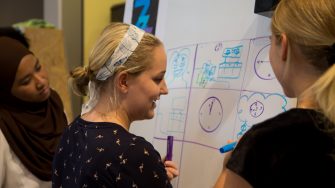Everyday I’m hustling: how the lean startup method can help you live
School of the Arts & Media
School of the Arts & Media

The lean startup method teaches you to embrace failure to fast-track radical change, whatever your agenda, says UNSW’s Associate Professor Emma A. Jane.
UNSW alumnus Sam Koslowski has made a business out of explaining the news to his friends. Four years ago, the 27-year-old launched The Daily Aus, an Instagram-driven news service for young people, with co-founder Zara Seidler.
Today The Daily Aus is one of Australia’s fastest moving startups delivering the news in digestible bites to 285,000 people a day.
“They [can] read The Daily Aus over a coffee in under a minute. It is the introduction to quality journalism for over 1.1 million Australians per month, and that is a responsibility we take very seriously,” the Law/Media graduate says.
Old-school news values – independence, integrity, responsibility – drive reporting tailored to engage a young audience. According to its website: “It’s a bit of tightrope balancing what we know young people care about, versus what we think young people should care about.
“You’re likely to see explainers on Bitcoin, climate action and travel bubbles as well as the infinitely less sexy: taxes, inflation and by-elections.”
The Daily Aus exemplifies the principles of lean startup as outlined in Eric Ries’s book of the same name. Ries prescribes a model of continuous innovation: build (a barebones version of your original idea known as a “minimum viable product”), measure (what people do with it) and learn (whether to pivot or persevere with your concept), “then rinse and repeat,” says UNSW’s Associate Professor Emma A. Jane who heard Sam’s first pitch of The Daily Aus.
Fast and furious product iteration, informed by user feedback, leads to “validated learning”, as Ries calls it, or knowledge that is evidence-based and actionable.
“The whole point [of The Lean Startup] is to reduce waste: wasted resources, wasted energy, wasted creativity, wasted money,” A/Prof. Jane says. “It’s not [just] about business. It's a method and methods are agnostic. It's a very powerful tool that anyone can use no matter what they're working on.”
A/Prof. Jane convenes UNSW’s Media Entrepreneurship in UNSW’s School of the Arts & Media. Students devise, launch and test their own media-driven startups, using principles from design thinking and Ries’s method.
A/Prof. Jane is a self-professed convert: “I’ve drank the startup coolaid,” she says. “I've taken this approach and run with it in nearly every area of my life. I try not to put too much energy into something until I've tested my assumptions. What a beautiful way to live, right?”
Reading Ries shattered her previous equation of entrepreneurship with white male privilege, rapacious greed and “weasel words” – think Donald Trump, she says.
By contrast, A/Prof. Jane’s research is driven by a social justice agenda, spanning feminism, trans/gender studies, sexuality, digital media and digilantism, cyberhate and misogyny.
“I don’t have many moments of revelation but reading The Lean Startup just blew my mind.”
Ries’s build-measure-learn feedback loop is equally applicable to big business and big social change, she says. It demonstrates how entrepreneurial skills translate across disciplines, provoking radical solutions to real-world problems, she says.
The course is hands-on, supported by expertise from UNSW’s Founders Program, with students learning transferable skills, such as how to build a website, produce an explainer video, interview end-users, pitch, and perhaps most importantly how to test their assumptions and risk failing gloriously.
It all culminates in a Shark Tank with a twist. Rather than pitching their startup, students pitch how much they learned. So failed startups can still win. The insight to be gained from failure is undervalued, A/Prof. Jane says.
“If you do a great experiment and show that you’re wrong about something, that’s a brilliant result. That is science at its finest. This is the tip of a much bigger iceberg in terms of problems with the way research is conducted across all of our disciplines…
“There’s not enough room for negative or unspectacular findings even though these are just as critical as the positive and spectacular ones.”
Within the pandemic and the wider era of digital disruption and rapid change, startups are thriving, A/Prof. Jane says. “Crises often generate innovation. World War II yielded some of the first digital computers and unexpected discoveries like superglue.
“And Dropbox, Uber, AirBnB, Whatsapp and Pinterest were all founded during or just after the 2008 Global Financial Crisis.”
This concept has personal resonance for A/Prof. Jane who believes transformation can rise out of trauma.
In addition to grounding her teaching and research, Ries’s methodology was invaluable in the writing of her memoir. Diagnosis Normal fuses research with autobiography in its exploration of autism, mental illness and childhood sexual abuse and their social context.
Her writing and research are a means to make sense of her own experience, she says, to situate it within the bigger picture. And while reliving her trauma was “horrific”, reclaiming her voice was a radical act towards thriving, rather than just surviving, she says.
“It was very, very satisfying to finally tell the story… It was a very cathartic experience.”
Diagnosis Normal was released in March 2022.
Rapid prototyping allows students to identify pain points to a problem so they can create a solution. Image: UNSW Founders' Workshop.
Lead Image: Media Entrepreneurship students learn to rapidly build new skills as they test their ideas in the real world. Image: UNSW Founders' Workshop.
This article was originally published in 2022.